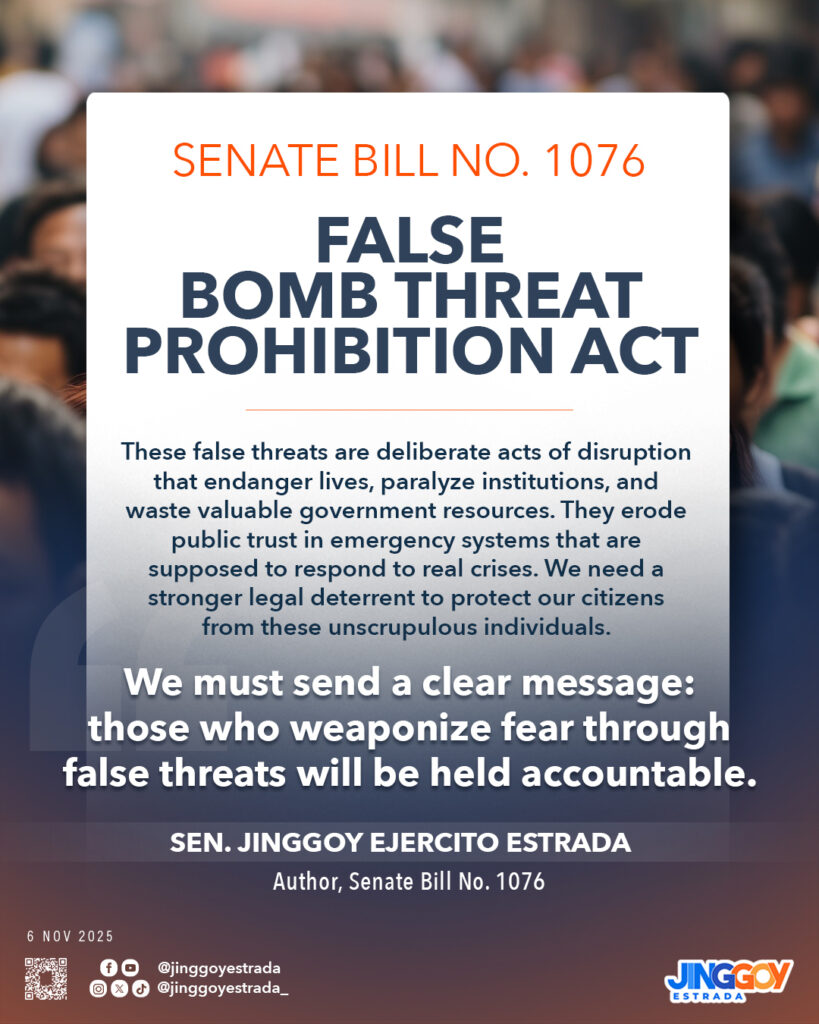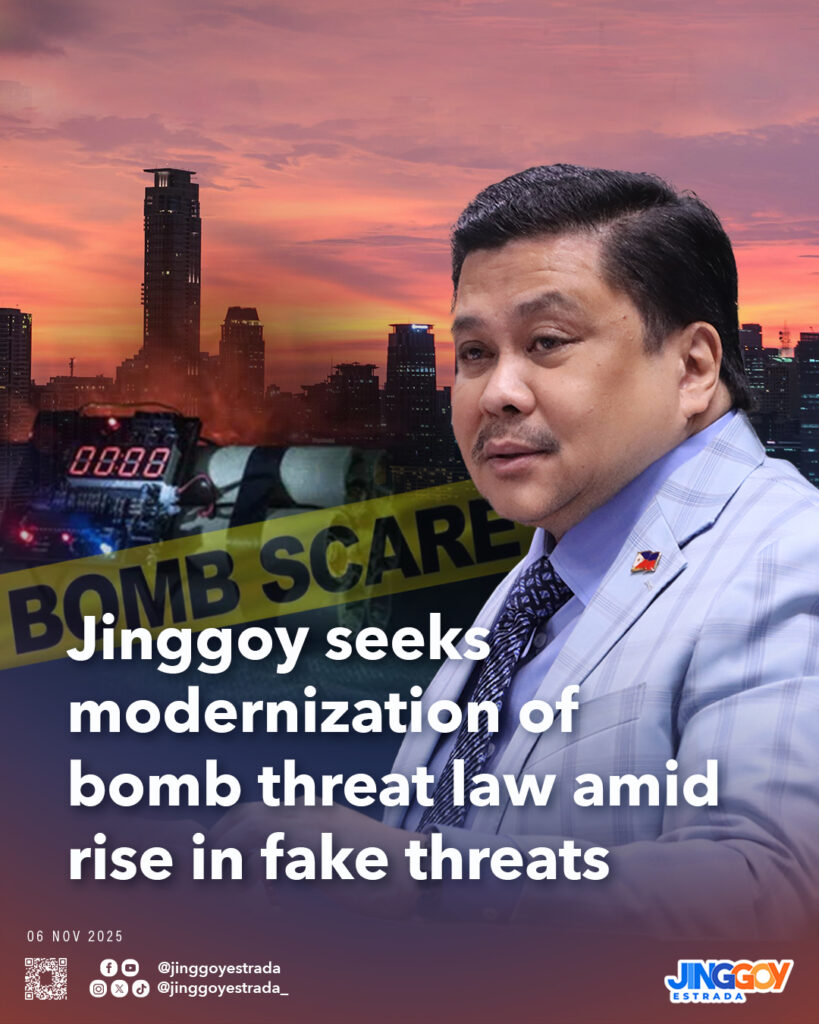Stiffer penalties and broader scope to cover digital platforms proposed
Jinggoy seeks modernization of bomb threat law amid rise in fake threats
IN light of the recent spate of reported hoax bomb threats, Senator Jinggoy Ejercito Estrada wants the Senate to enact a measure that would impose stiffer penalties and expand the coverage of the outdated Presidential Decree No. 1727 to also include digital platforms.
From the current penalty of imprisonment of up to five years or a fine of P40,000, Estrada is proposing heavier sanctions against individuals who maliciously spread false information about bombs, explosives, or incendiary devices in key public areas — a jail term of six to twelve years, or a fine ranging from P1 million to P5 million, or both.
“The safety and security of the public are non-negotiable. These false threats are deliberate acts of disruption that endanger lives, paralyze institutions, and waste valuable government resources. They erode public trust in emergency systems that are supposed to respond to real crises. We need a stronger legal deterrent to protect our citizens from these unscrupulous individuals,” Estrada said.
Estrada filed Senate Bill No. 1076, or the proposed “False Bomb Threat Prohibition Act,” on the heels of a disturbing series of hoax bomb threats that disrupted operations in schools and government offices in Bulacan, Bicol, Cebu, Caloocan City, and Manila City.
Estrada noted that just last month, four schools in Davao City were targeted within 48 hours, prompting mass evacuations and class suspensions. In Pampanga, a 21-year-old woman was charged for sending online bomb threats to several schools, while operations at the Office of the Vice President were temporarily halted due to a similar incident earlier this year.
SBN 1076 builds upon the existing framework of Presidential Decree No. 1727, which penalizes bomb jokes and hoaxes. Recognizing the evolution of communication technologies, the bill seeks to expand the scope to include threats made via social media, messaging apps, and other digital platforms, and designates a lead implementing agency to oversee enforcement and public awareness campaigns.
“The rise of social media and digital communication platforms has made it easier for malicious individuals to spread panic with just a few clicks. It’s time we update our laws to keep up with these realities,” Estrada said.
“This is about restoring public trust and ensuring that our communities feel safe,” Estrada added. “We must send a clear message: those who weaponize fear through false threats will be held accountable.”

Mas mabigat na parusa at papalawak ng saklaw ng batas laban sa nagpapakalat ng bomb threat, isinusulong ni Jinggoy
BUNSOD ng sunod-sunod na napapaulat na insidente ng pekeng bomb threat, ipinapanukala ni Senador Jinggoy Ejercito Estrada ang pagpapataw ng mas mabigat na parusa at pagpapalawak sa saklaw ng Presidential Decree No. 1727 para isama ang mga digital platforms.
Mula sa kasalukuyang parusang aabot sa limang taon na pagkakakulong o multang P40,000, iminungkahi ni Estrada ang mas mabigat na parusa laban sa mga indibidwal na sinasadyang magpakalat ng maling impormasyon ukol sa bomba, pampasabog, o iba pang mapanirang kagamitan sa mga pampublikong lugar —pagkakakulong ng anim hanggang labindalawang taon, o multang mula P1 milyon hanggang P5 milyon, o parehas na kaparusahan.
“Ang kaligtasan at seguridad ng publiko ay hindi maaaring isantabi. Ang mga pekeng banta ay lumilikha ng kaguluhan na naglalagay ng mga buhay sa peligro, nagpapahinto sa operasyon ng mga institusyon, at nagsasayang ng pondo ng pamahalaan. Pinapahina nito ang tiwala ng publiko sa mga emergency system na dapat tumutugon sa totoong krisis. Kailangan natin ng mas matibay na batas upang maprotektahan ang publiko laban sa mga mapanlinlang na indibidwal,” pahayag ni Estrada.
Inihain ni Estrada ang Senate Bill No. 1076 o ang panukalang “False Bomb Threat Prohibition Act” kasunod ng serye ng mga pekeng bomb threat na nakaapekto sa operasyon ng mga paaralan at tanggapan ng pamahalaan sa Bulacan, Bicol, Cebu, Caloocan City, at Maynila.
Noong nakaraang buwan din ay apat na paaralan sa Davao City ang naging target ng bomb threat sa loob ng 48 oras, na nagdulot ng malawakang evacuation at suspension ng mga klase. Sa Pampanga, isang 21-anyos na babae ang sinampahan ng kaso matapos magpadala ng mga online bomb threat sa ilang paaralan, habang pansamantalang nahinto naman ang operasyon ng Office of the Vice President dahil sa kahalintulad na insidente ngayong taon.
Ang SBN 1076 ay nakabatay sa umiiral na Presidential Decree No. 1727 na nagpaparusa sa mga bomb joke at hoax. Sa panukalang pagrepaso sa batas, nais ni Estrada na palawakin ang saklaw nito upang isama ang mga banta na ipinapadala sa pamamagitan ng social media, messaging apps, at iba pang digital platforms, at nagtatakda ng lead implementing agency na mangangasiwa sa pagpapatupad at mga kampanya para sa kaalaman ng publiko.
“Dahil sa pag-usbong ng social media at mga digital communication platform, mas naging madali para sa mga taong may masasamang hangarin na maghasik ng takot sa iilang pindot lamang. Panahon na para baguhin natin ang ating mga batas upang makasabay sa ganitong reyalidad,” ani Estrada.
“Layunin ng aking panukalang batas ang maibalik ang tiwala ng publiko at matiyak ang kaligtasan ng ating mga komunidad,” dagdag pa niya. “Kailangan nating magpadala ng malinaw na mensahe: ang sinumang gumagamit ng takot sa pamamagitan ng pekeng banta ay pananagutin.”


